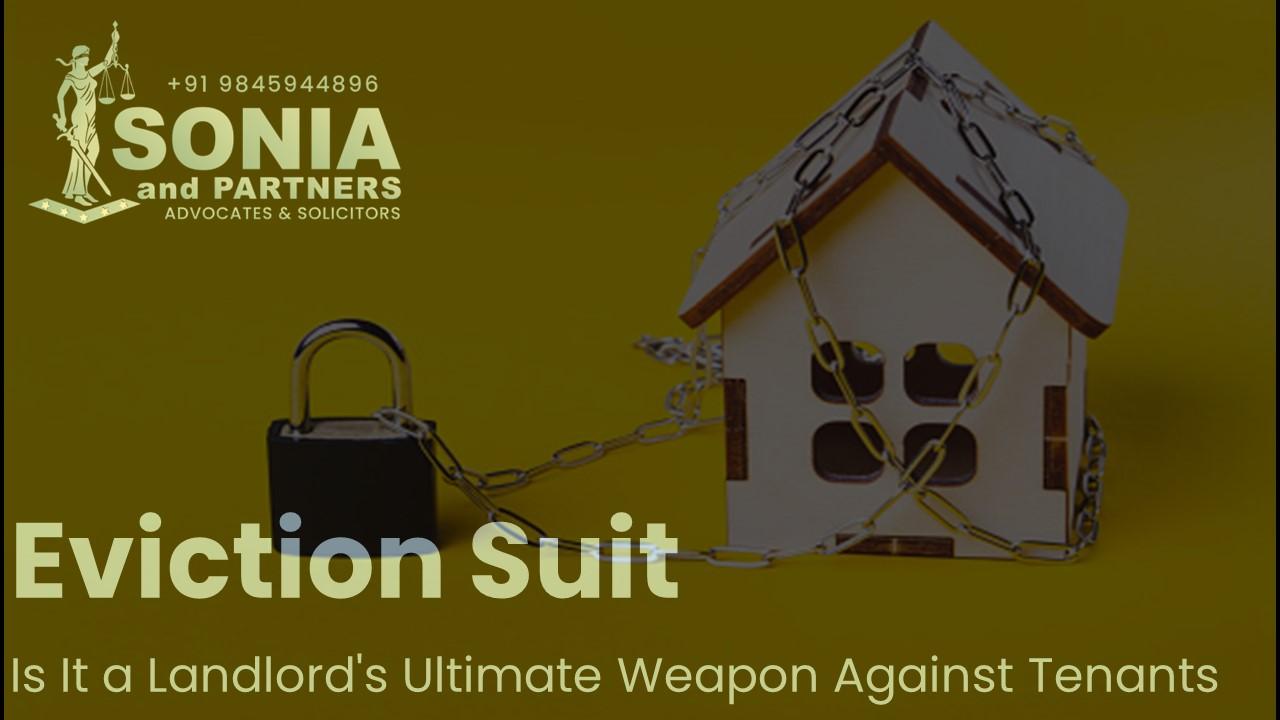Home Blog
Blog Eviction Suit Is It a Landlord’s Ultimate Weapon Against Tenants
Eviction Suit Is It a Landlord’s Ultimate Weapon Against Tenants

An eviction suit, also known as an unlawful detainer lawsuit, is a legal action taken by a landlord against a tenant who has violated the terms of their lease agreement. The purpose of an eviction suit is to regain possession of the rental property and, in some cases, to collect unpaid rent or damages caused by the tenant.
The following is a detailed blog post outlining the key aspects of an eviction suit:
Grounds for eviction: The landlord must have a valid reason for evicting the tenant. Common grounds for eviction include non-payment of rent, violation of lease terms, property damage, and illegal activity on the premises.
Notice to vacate: Before filing an eviction suit, the landlord must provide the tenant with a notice to vacate the premises. The notice must comply with state and local laws and typically provides the tenant with a set amount of time to vacate the property voluntarily.
Filing the lawsuit: If the tenant fails to vacate the property within the specified timeframe, the landlord may file an eviction lawsuit in court. The lawsuit typically includes a complaint outlining the reasons for eviction, a summons notifying the tenant of the lawsuit, and a court date for a hearing.
Serving the tenant: The tenant must be served with the eviction lawsuit and summons. This can be done in person by a process server or by certified mail, depending on state and local laws.
Hearing: The eviction hearing is typically scheduled within a few weeks of the lawsuit being filed. At the hearing, both the landlord and tenant have an opportunity to present their case before a judge. If the judge rules in favor of the landlord, an order of eviction is issued, giving the tenant a set amount of time to vacate the property.
Writ of possession: If the tenant fails to vacate the property within the specified timeframe, the landlord may request a writ of possession from the court. The writ allows the landlord to take possession of the property with the assistance of law enforcement if necessary.
Collection of unpaid rent and damages: If the landlord has suffered financial damages as a result of the tenant’s actions, such as unpaid rent or property damage, they may also pursue a separate legal action to collect those damages.
A tenant can defend against an eviction suit in several ways, including:
Validity of Notice: The tenant can challenge the validity of the notice served by the landlord. If the notice is not served in accordance with the law, the eviction suit may be dismissed.
Breach of Lease Agreement: If the tenant can prove that the landlord has breached the lease agreement, the eviction suit may be dismissed.
Lack of Notice: If the landlord did not serve a notice to vacate the property, the tenant can argue that the eviction suit is invalid.
Retaliation: If the landlord filed the eviction suit as retaliation for the tenant exercising their legal rights, such as complaining about the condition of the property, the eviction suit may be dismissed.
Payment of Rent: If the tenant pays the unpaid rent and any associated costs, the eviction suit may be dismissed.
The Courts have delivered several landmark judgments related to eviction suits over the years. Some of these landmark judgments are:
Olga Tellis v. Bombay Municipal Corporation: In this case, the Supreme Court held that the right to livelihood was a fundamental right under the Indian Constitution, and eviction of slum dwellers without providing them with alternative accommodation would be violative of their fundamental rights.
Chameli Singh v. State of U.P.: In this case, the Supreme Court held that tenants who have been in occupation of a premises for a long period of time, and who have made substantial improvements to the property, cannot be evicted by the landlord except on specified grounds.
Harshad Chiman Lal Modi v. DLF Universal Ltd.: In this case, the Supreme Court held that the lessee of a property has the right to renew the lease agreement, and that the lessor cannot refuse to renew the lease agreement without sufficient cause.
Salem Advocate Bar Association v. Union of India: In this case, the Supreme Court held that eviction of tenants by use of force and without following due process of law would be unconstitutional and illegal.
Ghaziabad Development Authority v. Balbir Singh: In this case, the Supreme Court held that eviction of tenants cannot be ordered by the court without giving them an opportunity to be heard, and without considering their rights and interests.
Conclusion
In conclusion, an eviction suit is a legal process that allows a landlord to regain possession of a rental property when a tenant has violated the terms of their lease agreement. The process typically involves providing notice to vacate, filing a lawsuit, and attending a court hearing before an order of eviction is issued. If you are a landlord or tenant involved in an eviction suit, it is important to consult with a qualified attorney to ensure that your rights are protected throughout the process.
Feel free to write to us at mail@lawyersonia.com or call +91 9845944896 if you wish to consult or discuss your matter. “Sonia and Partners” is a Boutique law firm led by Adv. Sonia Rajesh supported by a team of qualified and among the Best Lawyers in Bangalore practicing in the area of Family Law, Property Law and Criminal defence serving Citizens of India, Overseas Indians, NRIs and Global International Clients.
 11:00 – 19:00
11:00 – 19:00